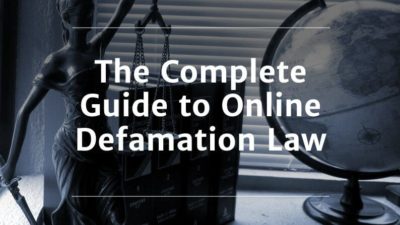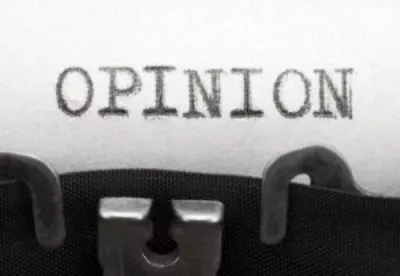
Is Libel a Crime? A Guide to U.S. Criminal Defamation & Libel Laws
This page has been peer-reviewed, fact-checked, and edited by qualified attorneys to ensure substantive accuracy and coverage.
U.S. criminal defamation and libel laws can be confusing. Many people wonder if it’s illegal to spread harmful lies about another person, and what can be done when it happens. Defamation and libel are in fact illegal in the United States and give rise to criminal sanctions. But, they only exist in a handful of states and are rarely enforced.
Don’t worry! While criminal sanctions are limited in defamation cases, defamers can still go to jail in three key situations:
- When they’ve violated a restraining order.
- When they are held in contempt of court for violating a court order relating to libelous behavior.
- When they are charged with related crimes, such as harassment, extortion, or stalking.
There are also several other ways to hold defamers accountable for their actions, so make sure to keep reading!
Many of the people we speak with every day have questions about whether they can press charges against someone who has defamed them online. If this is you, then this guide is here to put that confusion to rest, along with proving other key information on your rights and remedies.
We’ll start by explaining what libel is, and dive into what you can do if you’re the victim of libel.
What Is Libel?
Libel is a form of defamation expressed in writing that injures a person’s reputation. You’re being libeled if a person makes a false statement to others about you and it injures your reputation, exposes you to ridicule, or hurts your business.
All U.S. states have civil libel statutes, meaning you can sue those who have spread and published false statements about you. A few states also still have criminal libel laws on their books too.
Are you the target of libel?
Contact us for a free consultation with an intake specialist to help you explore your legal options and craft an effective strategy.
Contact Minc LawCriminal Libel Laws Are Limited
Currently, only 13 states have criminal libel laws that are still enforced. Those states are Idaho, Louisiana, Michigan, Minnesota, New Mexico, North Carolina, Oklahoma, Utah, Virginia, Wisconsin, Montana, New Hampshire, and North Dakota.
In those states, people who commit libel can face serious criminal consequences, up to and including jail sentences in the most extreme cases. The table below provides links to each state’s criminal libel statute as well as a brief excerpt for reference.
| Idaho | “Every person who willfully, and with a malicious intent to injure another, publishes or procures to be published, any libel, is punishable by fine not exceeding $5,000, or imprisonment in the county jail not exceeding six (6) months.” |
| Louisiana | “Defamation is the malicious publication or expression…to anyone other than the party defamed, of anything which tends: to expose any person to hatred, contempt, or ridicule, or to deprive him of the benefit of public confidence or social intercourse…” |
| Michigan | It is a misdemeanor to falsely accuse another of a crime or “particular conduct,” such as a lack of chastity. |
| Minnesota | “Whoever with knowledge of its defamatory character…communicates any defamatory matter to a third person without the consent of the person defamed is guilty of criminal defamation and may be sentenced to imprisonment for not more than one year or to payment of a fine of not more than $3,000, or both.” |
| New Mexico | “Libel consists of making…or circulating without good motives and justifiable ends, any false and malicious statement affecting the reputation, business or occupation of another, or which exposes another to hatred, contempt, ridicule, degradation or disgrace.” |
| North Carolina | “If any person shall state…to the manager, editor, publisher or reporter of any newspaper or periodical for publication therein any false and libelous statement concerning any person or corporation, and thereby secure the publication of the same, he shall be guilty of a Class 2 misdemeanor.” |
| Oklahoma | “Any person who makes a libel, willfully publishes one or willfully or knowingly aids in the making of a libel may be punished by up to one year in jail and/or a fine of $1,000 (and shall be liable in civil court to the injured party). |
| Utah | “A personal is guilty of criminal defamation if he knowingly communicates to any person orally or in writing any information which he knows to be false and knows will tend to expose any other living person to public hatred, contempt, or ridicule.” |
| Virginia | “Any person who knowingly and willfully states…any false and untrue statement…concerning any person or corporation…shall be guilty of a Class 3 misdemeanor.” |
| Wisconsin | “Whoever with intent to defame communicates any defamatory matter to a third person without the consent of the person defamed is guilty of a Class A misdemeanor.” |
| Montana | “Whoever, with knowledge of its defamatory character, orally, in writing, or by any other means, including by electronic communication, as defined in 45-8-213, communicates any defamatory matter to a third person without the consent of the person defamed commits the offense of criminal defamation and may be sentenced to imprisonment for not more than 6 months in the county jail or a fine of not more than $500, or both. |
| New Hampshire | “A person is guilty of a class B misdemeanor if he purposely communicates to any person, orally, or in writing, any information which he knows to be false and knows will tend to expose any other living person to public hatred, contempt or ridicule. |
| North Dakota | “A person is guilty of a class A misdemeanor if he willfully publishes defamatory matter or knowingly procures such publication or in any way knowingly aids or assists in the same being done.” |
Many other states’ criminal libel laws have been overturned for being too broad and infringing on free speech. In the past, and in other countries, criminal libel laws were used to criminalize dissenting speech and protests. China, in particular, has criminal laws that broadly prohibit speech against the government. The United States has taken careful measures to protect speech, making criminal libel charges a tough sell in most cases.
Since there are strong protections for free speech in the U.S., criminal libel can be difficult to prove. This is true even in the states which still have criminal libel statutes. In most states, a victim must show that the defamer knew their statements were false by proving it “beyond a reasonable doubt.” Civil libel cases, on the other hand, require a lower standard of proof than criminal cases.
Can Someone Go to Jail for Criminal Libel?
Yes. However, it is extremely rare.
Even though criminal libel cases are rare, defamers can still go to jail for their actions, regardless of which state they live in. There are 3 primary ways a defamer can be sentenced to jail time:
- Restraining order: If you have a restraining order against the defamer, they can face jail time for violating that order.
- Contempt of court: If the defamer is held in contempt of court for a violation of an existing court order relating to the libelous behavior.
- Related crimes: If the defamer is charged with other related crimes such as online harassment, sextortion, or online stalking.
What Other Remedies are Available for Victims of Libel?
While jail may not be a common consequence for libel, there are other remedies available to victims of libelous behavior. These are known as “civil remedies”. The attorneys of Minc Law focus on helping victims of defamation with the following types of civil remedies.
Equitable Relief
When you’re on the receiving end of libel, the first thing you want is for the behavior to stop. This can be accomplished through a remedy referred to as “equitable relief.”
Equitable relief is when you ask a court to order another party to refrain from a particular action or perform a specific action.
Content removal is a common equitable remedy because it typically seeks a court requiring a website to remove content. Restraining orders are another form of equitable relief that can be used to prevent further harassment and put a stop to defamatory speech.
Monetary Relief
You can seek reimbursement (monetary relief) for financial losses you incurred as a result of libel. This includes reimbursement for:
- Attorneys’ fees,
- Lost income, or
- Lost business.
If you can prove the libel caused emotional distress, you may be able to get reimbursed for medical bills as well.
The drawback to requests for monetary relief is the fact that damages aren’t always easy to prove. Sometimes expert witnesses, like accountants and doctors, are needed for these types of cases, which can increase the cost of your case.
An Experienced Libel Attorney Can Help
If someone is spreading lies about you, it’s important to work with an attorney who has experience with online libel. Especially if you believe you are the victim of criminal libel.
We know how to legally stop someone from spreading lies about you. While prosecutors and law enforcement are the only people who can file criminal libel charges, a defamation attorney can help. A defamation attorney can:
- Identify anonymous online posters and trolls,
- Launch an investigation on your behalf,
- File claims with police, and
- Work with prosecutors to bring you justice.
Whether you would like to pursue criminal or civil remedies, a defamation lawyer can help you assess your chances of success. They can also help you strategize, so you get all the relief you are entitled to.
If you think someone is libeling you and want to learn more about your rights, read up further over at our Legal Resource Center or reach out to an attorney on our team. You can get in touch with an online libel expert at Minc Law via chat, email, or contact form. We offer free consultations if you’d like more personalized information based on your unique situation.
Are you interested in learning more about Minc Law’s internet defamation services, or are you unsure of whether we are the best fit for your situation? In the video below, we go over the answers to our most frequently asked questions from clients, including the definitions of libel and slander, whether defamation lawyers are criminal or civil lawyers, if an attorney in another state can represent you, how we identify anonymous perpetrators, and how to get started with Minc Law
Video: Top 6 Client Questions We Get at Minc Law





